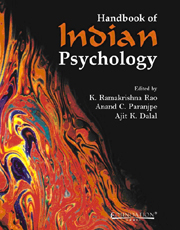Book contents
- Frontmatter
- Contents
- Contributing Authors
- Preface
- 01 Prologue: Introducing Indian Psychology
- 02 Indian Thought and Tradition: A Psychohistorical Perspective
- PART I SYSTEMS AND SCHOOLS
- PART II TOPICS AND THEMES
- PART III APPLICATIONS AND IMPLICATIONS
- 24 Therapeutic Psychology and Indian Yoga
- 25 Towards an Indian Organizational Psychology
- 26 Research on Indian Concepts of Psychology: Major Challenges and Perspectives for Future Action
- 27 Meditative Traditions and Contemporary Psychology
- 28 Consciousness Evolution of the Buddha until He Attained Satori
- 29 William James on Pure Experience and Samādhi in Sāṃkhya Yoga
- 30 Sri Ramaṇa Maharshi: A Case Study in Self-Realization
- 31 Altered States of Consciousness and the Spiritual Traditions: The Proposal for the Creation of State-Specific Sciences
- Pronunciation and Transliteration of Sanskrit Alphabet
- Glossary
- Index
28 - Consciousness Evolution of the Buddha until He Attained Satori
from PART III - APPLICATIONS AND IMPLICATIONS
Published online by Cambridge University Press: 26 October 2011
- Frontmatter
- Contents
- Contributing Authors
- Preface
- 01 Prologue: Introducing Indian Psychology
- 02 Indian Thought and Tradition: A Psychohistorical Perspective
- PART I SYSTEMS AND SCHOOLS
- PART II TOPICS AND THEMES
- PART III APPLICATIONS AND IMPLICATIONS
- 24 Therapeutic Psychology and Indian Yoga
- 25 Towards an Indian Organizational Psychology
- 26 Research on Indian Concepts of Psychology: Major Challenges and Perspectives for Future Action
- 27 Meditative Traditions and Contemporary Psychology
- 28 Consciousness Evolution of the Buddha until He Attained Satori
- 29 William James on Pure Experience and Samādhi in Sāṃkhya Yoga
- 30 Sri Ramaṇa Maharshi: A Case Study in Self-Realization
- 31 Altered States of Consciousness and the Spiritual Traditions: The Proposal for the Creation of State-Specific Sciences
- Pronunciation and Transliteration of Sanskrit Alphabet
- Glossary
- Index
Summary
In any religion, the natural, religious and familial environments in which the founder was born are closely connected with the founder's teachings. If the doctrines and logic are discussed without understanding these environments, it often ends in superficial and meaningless discussion. I will therefore touch on the environment and social conditions surrounding Śākyamuni Gautama's birth before I discuss how the Buddha's consciousness evolved before he attained satori i.e., enlightenment.
Śākyamuni's mother died soon after his birth, and his aunt raised him. He grew up without knowing a mother's true affection, and this seems one of the causes for his preaching of compassion. Another cause would be a large-scale socio-environmental change in India at the time he was born. By Śākyamuni's time, the number of agricultural products had increased, a monetary system had been instituted, and commercial and industrial markets had developed, all of which suppressed the traditional authority of the Brāhmans. People engaging in commerce and industry accumulated economic power and the cities developed accordingly. In addition, military power was increased to counteract invasions into India by the forces of other ethnic groups. This led to an increase in power of the Kṣatriyas (warrior class), which made it difficult for the Brahmans to regulate social organization. Śākyamuni's own country was small and weak, and there was a constant fear of it being merged into the neighbouring country of Kosala. Materialism, which is different from Brahmanical teachings, was widespread, and there was a social environment receptive to free thinking. Gautama's own agony laid the foundation for his teaching that this world is a world of suffering. Under these conditions, new religions based on Hinduism, such as Śākyamuni's, were generally accepted.
- Type
- Chapter
- Information
- Handbook of Indian Psychology , pp. 539 - 554Publisher: Foundation BooksPrint publication year: 2008
- 1
- Cited by



